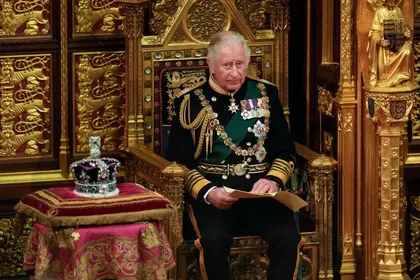From the earliest days of Russia’s full-scale invasion of Ukraine, the UK’s new sovereign has expressed support for Ukraine and, unusually for a member of the British Royal Family, criticism of Russia and its leader. But his links to Ukraine stretch back over 40 years to much happier times.
Just three days after his much-heralded engagement to Lady Diana Spencer, later Princess Diana, the then Prince Charles visited several community and religious centres in the UK city of Derby, in Feb. 1981. He took part in a tour of ethnic groups in the city, one of which was the Ukrainian Centre in Charnwood Street.
JOIN US ON TELEGRAM
Follow our coverage of the war on the @Kyivpost_official.
Joseph Kupranec, leader of the Hoverla Ukrainian Dance Ensemble at the time, recalled the visit in 2008: “Hundreds of excited people were packed at the front entrance, waving banners and flags on the arrival of the young Prince and congratulating him [on the engagement]. He was welcomed, in true Ukrainian tradition, with salt, bread and a glass of vodka. My Hoverla Ukrainian Dance Ensemble performed the famous Ukrainian folk dance, the Hopak, and the young ‘have-a-go Prince’ took up the offer to join in the vigorous traditional dance – much to our surprise.”

| Prince Charles dances the ‘Hopka’ at the Derby Ukrainian Centre, Feb. 1981.Photo: Derbyshire Live |
That was then.
As early as May 2014, following the initial Russian invasion, on a state visit to Canada while speaking to a woman who had lost relatives in the Nazi Holocaust, Charles likened Vladimir Putin to Adolf Hitler, saying: “And now Putin is doing just about the same as Hitler,” according to a report in the UK’s Daily Mail.

Diane Francis Interviews Mikhail Zygar, Yaroslav Trofimov on Prospects of Russia’s War on Ukraine
A week after the start of the 2022 war, the then Prince of Wales, addressed the audience at a ceremony to make an award to the widow of Sir David Amess, a British MP who was murdered in a terrorist attack. He categorized Amess’s murder as: “an attack on democracy, on freedom itself.”
He then went on to say, “We are seeing those same values under attack today in Ukraine in the most unconscionable way. In the stand we take here, we are in solidarity with all those who are resisting brutal aggression.”
Still as Prince of Wales, he made similar statements on visits to Romania, Canada and the Ukrainian Catholic Cathedral in London in 2022. Charles in speeches throughout the year continually described Putin's actions as “brutal aggression,” including at a reception in Waterford at the end of March 2022.
Charles ascended to the throne on the death of his mother, Queen Elizabeth II, in September and has continued to bluntly express his views on the war, which commentators have categorized as a huge shift from the subtle statements his mother had made on this and other international crises.
In a message to President Zelensky in August, made to coincide with Ukraine’s Independence Day, her only reference to the war was as “the challenging year” Ukraine has faced.
In a statement, the now King Charles, made on the anniversary of the full-scale invasion and following a meeting with President Zelensky at the beginning of 2023 he said: “… the people of Ukraine have suffered unimaginably from an unprovoked full-scale attack on their nation. They have shown truly remarkable courage and resilience in the face of such human tragedy.”
In a historic speech to the German Bundestag on March 30, Charles said that Russia’s war of aggression “threatens the security of Europe.” He paid tribute to Germany’s support for Ukraine, saying: “Germany's decision to send such significant military support to Ukraine is remarkably courageous, important and appreciated.”
Needless to say, the position taken by King Charles has not gone down well with the Kremlin. There was an exchange between Andrey Gurulyov, a retired military commander and deputy in the Russian federal assembly and TV presenter Olga Skabeyeva on the Russian state TV channel Russia-1 on Sep. 22. Gurulyov stated that Russia should target the UK with a nuclear strike. “Why would we bomb Ukraine or Germany, when there is Britain, the root of evil?”
But on Saturday the people of UK and their friends around the world won’t be thinking about Russian propaganda, they will concentrate on the crowning of the new king who epitomises many links to the past, none more so for the people of Derby who will remember the “have a go Prince” who visited them one cold, rainy day over forty years ago.
You can also highlight the text and press Ctrl + Enter






